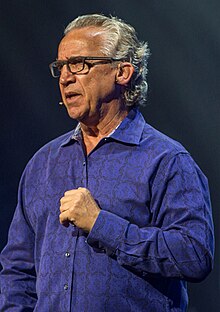Independent Network Charismatic Christianity
An international network of apostles is facilitated by modern communication technologies such as the internet, allowing the sharing of ideas and pursuit of joint projects without the limitations of operating within a hierarchical structure.
[3] These modern technologies allow INC leaders to build international ministries and followings, using the internet and social media to create interconnected online venues which do not depend of geographical ties.
[9] Dyron B. Daughrity, a professor of religion and philosophy at Pepperdine University, has noted that the charismatic beliefs and practices of International House of Prayer, an INC church, combined with the online accessibility of its content, has made it particularly appealing to millennials.
In contrast with classic pentecostalism, which tends to hold out little hope for social justice in this world and thus focuses its efforts on evangelism and discipleship, many INC groups believe that heaven can be made on earth through the action of Christians.
[11] This commitment to social change involves the desire to see INC Christians in positions of leadership in the "seven mountains of culture": business, government, media, arts and entertainment, education, family, and religion.
Philosopher James K. A. Smith has suggested that the religious mindset offered by INC Christianity — that of deference to powerful and charismatic leaders — could partly explain the growth of populism which led to the election of Donald Trump.
[14] Christerson and Flory identify the roots of Independent Network Charismatic Christianity in the Calvary Chapel and Vineyard movements of the late 1960s and 1970s, and John Wimber as the individual with whom many of the early INC leaders had a connection.
These leaders, including C. Peter Wagner, Bill Johnson, Ché Ahn and Mike Bickle, focused their efforts on spreading their personal influence through these networks and the use of new media technologies.
